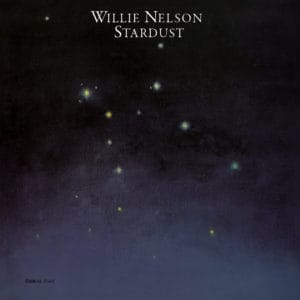Marketplace
2018 Analogue Productions PRESSING
- Catalog Number AAPP 116-45
- Release Year 2018
- Vinyl Mastering Engineer Bernie Grundman
- Pressing Weight 200g
- # of Disks 2
- Jacket Style Gatefold
- 100% Analog Mastering Yes
- Speed 45 RPM
Pop standards from Willie Nelson? Back in 1978 when the artist released Stardust, Columbia Records thought he had lost it. But there was no second-guessing Nelson and boy, was he right. His recording of the most standard of standards—”Blue Skies,” “Stardust,” “Georgia on My Mind,” “All of Me” (and that’s just side one of the disc)—seemed a little odd for a marijuana-loving country-western singer. But the thing took off and sold millions of copies, going quintuple platinum by 2002 and winning a Grammy. How Nelson got assessed $32,000,000 in unpaid taxes years later in the face of such sales is another story!
Stardust isn’t just a popular success—it drew critical raves as well. Nelson doesn’t just sing the standards, he pulls out previously unheard meanings. I’ll wager that when many listeners play “Stardust” or “Moonlight in Vermont” in their mind, Nelson’s versions are those they hear.
Obviously, “originals” of the LP are plentiful and cost little, but that doesn’t mean they sound equal given the long pressing run. In 2001, Classic Records issued a 33RPM LP followed by a 45RPM set mastered by Bernie Grundman. Neither bested a very early (white-label promo) copy I kept around. In 2013, Mobile Fidelity reissued the LP on its Silver Label line. Mastering engineer Paul Stubblebine likely did not work from the master tapes. Analogue Productions’ new 2018 45RPM version is also mastered by Bernie Grundman from the original analog master tapes.
Expectations are and should be high. The LP resided for some time on The Absolute Sound founder Harry Pearson’s oft-referenced and audiophile-minded Super Disc list. Stardust was recorded in a mobile recording facility called the Enactron Truck developed by Brian Ahern. Grundman mastered the original, the Classic, and this newest reissue. As they say, the third time is the charm. A white-label promo original copy sounds like a disc that belonged on The Absolute Sound’s list, although a bit of distortion mars the highest notes. On the Mobile Fidelity reissue, the distortion vanishes. In addition, you get more air and reverb around the instruments (especially the piano), a bit more soundstage depth, and slightly tighter bass.
While more expensive, Analogue Productions’ 45RPM reissue makes the piano seem more life-sized and restores all the overtones missing from the earlier reissues—all the while delivering enhanced percussion detail and tauter bass. I’m certain that somewhere ahead of the master tape, recording engineers Bradley Hartman and Donivan Cowart slowed down the tape in places for effect. Listen to the opening bars of “September Song” where the knobs got turned a little too slow. No matter. Analogue Productions’ Stardust again earns a super disc designation by today’s higher standards.
Stardust


 5
5